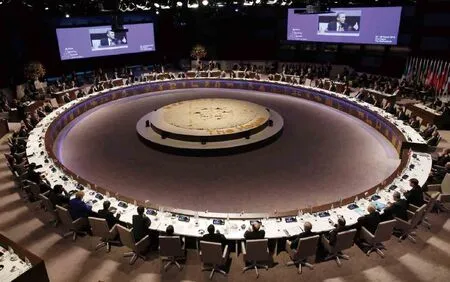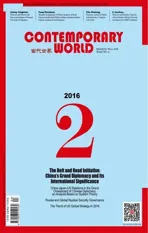US and Global Governance of Nuclear Security: from Guiding to Leading
2016-11-23FAnJIsHE
FAn JIsHE
Director and Researcher, Strategy Research Office,Institute of American Studies,Chinese Academy of Social Sciences
US and Global Governance of Nuclear Security: from Guiding to Leading
FAn JIsHE
Director and Researcher, Strategy Research Office,Institute of American Studies,Chinese Academy of Social Sciences

The picture features a scene of the Closing Ceremony of the Third Nuclear Security Summit at Hague, March 25, 2014.
GLoBAL GoVERnAncE oF NUcLEAR SEcURITY: US GUIDInG RoLE
As early as at the beginning of the Cold War, the US realized the risks of nuclear security being that a country with nuclear materials may secretly transport nuclear weapons into the US and launch an attack. Aimed at lowering the risks, the US has committed itself to pushing the international community in building the nuclear nonproliferation systems, founding the International Atomic Energy Agency,strengthening the monitoring of nuclear energy for civilian purpose, and setting up a multilateral mechanism for export control. The institutions and systems built during the Cold War with the US playing a major role featured distinctive anti-proliferation purpose, instead of keeping away terrorists or terrorist groups.
The end of the Cold War resulted in an increasingly prominent nuclear security issue. Thus, the US played a guiding role in global governance of nuclear security in the following twenty years by working closely with Russia, Ukraine, Kazakhstan, Belorussia and other countries in nuclear security, effectively preventing nuclear weapons or materials from falling into criminals' hands.
The nuclear security governance before 9-11 was focused on preventing the states from acquiring nuclear material, technology or products. After the 9-11, the focus was turned to preventing terrorists or terrorist groups from making nuclear terrorism. The US made great efforts in pushing through the approval of Resolution 1373 and Resolution 1540 by the UN Security Council in 2001 and 2004 respectively. The international community has made some achievements in building nuclear security institutions, including the revision of the Convention on the Physical Protection of Nuclear Material and the UN Assembly's approval of the International Convention for the Suppression of Acts of Nuclear Terrorism. Meanwhile,bilateral or multilateral cooperation on nuclear security increased remarkably, to name some, the expansion of the US-led programme “Cooperate to Reduce Threat”, the “Global Partner-ship Against the Spread of Weapons and Materials of Mass Destruction”initiated by G8, and the creation of the“Global Initiative to Combat Nuclear Terrorism” announced by the US and Russia jointly.
GLoBAL NUcLEAR SEcURITY GoVERnAncE: US LEADInG RoLE
No matter during the Cold War or during the nearly two decades after the Cold War, the US has always been playing a dominant role in nuclear security governance for it was the first country to follow the nuclear security issue, to guide the bilateral or multilateral cooperation on nuclear security and to advance the establishment,maintaining and enforcement of international institutions related to nuclear security. Therefore, the global nuclear security governance before the Obama Administration could be regarded as a US guiding period, while along with the initiating and convening of the Nuclear Security Summit, the global nuclear security governance has entered into a period with the US playing a leading role.
Right after taking office as the President, Obama vowed to be committed to building a non-nuclear weapon world by enhancing the protection of the nuclear material security in a global sphere. He also proposed to convene the Nuclear Security Summit, through which, the US has pooled the consensus of the international community on nuclear security and realized the remolding of the global nuclear security governance.
In the past two decades, the US worked alone providing funds and labour to help enhance the control of the nuclear security risks in CIS states. Later on, some major developed countries joined the US. In the past seven years, with the convening of the Nuclear Security Summit, more countries have participated in this work. More and more countries and international organizations positively responded to the Summit initiated by the US. The state leaders all made their commitments at the Summit, which helped to uplift the nuclear security issue on the domestic agenda of all countries and increase the input of relevant manpower, materials and financial resources. Thus, the global governance of nuclear security has entered a “crowdfunding” era. Moreover, the convening of the Nuclear Security Summit has further strengthened the existed international norms and highlighted the necessity of international cooperation. The declarations of the three Summits all explicitly require that all countries join and abide by the existed treaties and mechanisms for nuclear security,and urge all states to strengthen various forms of cooperation on nuclear security.
US AnD GLoBAL NUcLEAR SEcURITY GoVERnAncE: FRoM 2016 on
It can be forecasted that after the fourth Nuclear Security Summit, the global nuclear security governance will become normal, and will turn from the heads of state level to the working level. The IAEA will serve as the core actor of the future global nuclear security governance. It still needs to be observed as to what extent the states could help the IAEA in solving the problems of “shortage of money,manpower and authorization”. The nuclear security governance has turned from being dominated by major powers to being participated by all states. However, it is still doubtful whether the countries with varied national conditions, challenges and capabilities could strengthen the management and control of nuclear materials from the origin. International cooperation is also needed for strengthening nuclear security. Could the developed countries provide personnel training,information sharing or even supports in fund, technology and equipment?Could the developing countries cooperate with the IAEA in a proactive way? All those are questions to be answered.
To the US, there are also some uncertainties in the global nuclear security governance. President Obama takes the nuclear security threat seriously,and has made tremendous efforts to it. The US Congress has never explicitly resisted the action of the Executives. However, will the next president paid same attention to the nuclear security issue? Will the future Congress struggle between the two parties involve the nuclear security issue? Moreover,since the US-Russia relationship deteriorated due to the Kashmir problem,Russia not only stopped the bilateral cooperation on nuclear security, but also resisted the fourth Nuclear Security Summit, bringing about more uncertainties to the future global nuclear security governance.
